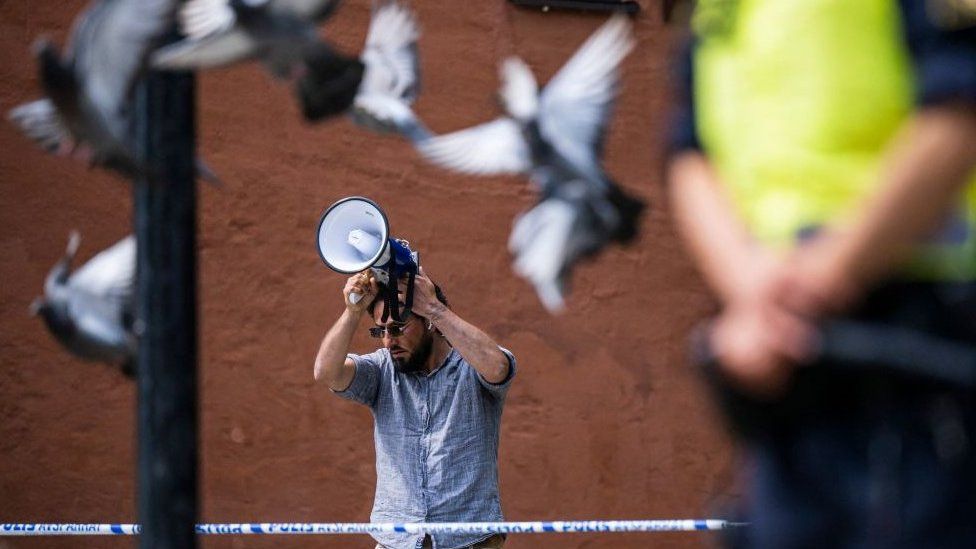A spate of Quran burnings in Sweden has badly affected the country’s image abroad and led to a deterioration of the security situation at home, security service Sapo has warned.
Many Muslim-majority countries have expressed outrage. Last week protesters set fire to Sweden’s embassy in Iraq after learning police in Stockholm had given permission for more book burning.
For Swedes, the issue has thrown up a major dilemma, because at stake is a historic and fundamental right dating back to 1766.
“Sweden has one of the world’s strongest legal protections for freedom of expression,” says Marten Schultz, professor at Stockholm University’s faculty of law.
The Nordic nation also scrapped its blasphemy laws in the 1970s.
Its constitution guarantees the right to freedom of expression on any subject, including “expressions of opinion that question religious messages, or that can be perceived as hurtful to the believer”.
But its centre-right-led government is now considering possible changes to the laws that have allowed the Quran burnings in Stockholm to take place.
That is because police initially refused to allow two planned book-burnings earlier this year due to of the risk of making Sweden a “higher priority target for attacks”.
They had cited the Public Order law, or Ordningslag, as justification for the ban.

But then the courts overruled the police, arguing that the security risks did not have a sufficiently clear connection to the planned gatherings or their immediate surroundings to refuse permission.
Under the law, gatherings can only be banned if they are a threat to public safety.
When permission was given to an Iraqi Christian refugee last week it was his second stunt in a month, although he stopped short of burning the Quran.
Critics have pointed out that Sweden does have a law prohibiting incitement against ethnic groups, in place since 1949 in response to the Holocaust.
But experts say the Quran burnings targeted a book instead of people or individuals, so this reading of the law was not appropriate in the context of banning the gatherings.
“Freedom of speech is part of our legal culture,” Professor Schultz told the BBC. “It’s not just the law but a fundamental value.”
But it comes at a cost.
The courts’ decision to allow such protests infuriated Turkey’s President Recep Tayyip Erdogan, nearly derailing Sweden’s bid to join the Nato military alliance.

Book burnings and disinformation campaigns have turned Sweden’s image “from a tolerant country to a country hostile to Islam and Muslims”, according to Sweden’s security service.
“The security police are now dealing with ongoing threats of attacks directed at Sweden and Swedish interests,” said Sapo as it raised Sweden’s five-stage terrorist threat level to three.
The government has also accused Moscow of spearheading a campaign of disinformation.
“We see, among other things, that Russian players are active in spreading the incorrect claim that Sweden as a state would be behind the desecration of various scriptures,” said Prime Minister Ulf Kristersson.
“That is, of course, completely incorrect.”
Sapo said the fake news campaigns also claimed Sweden had green-lit attacks on Muslims and the kidnapping of Muslim children by social services.
Sweden’s liberal laws on freedom of expression have not come under this kind of scrutiny since the late Swedish visual artist Lars Vilks sketched the Prophet Muhammad with a dog’s body in 2007.
- Why depicting the Prophet Muhammad causes offence
Vilks’s sketch prompted a series of violent attacks, on his home in Sweden and then in neighbouring Denmark in 2014.
It was a Danish-Swedish far-right activist called Rasmus Paludan who triggered the latest outcry when he was given permission to burn a Quran outside the Turkish embassy in Stockholm in January.
Unlike Sweden, Denmark does not require permission to gather.

Only this week a far-right group called “Danish Patriots” burned the Quran outside the Iraqi embassy in Copenhagen.
Anger spilled over this week at the United Nations, where several European countries argued that burning holy books was offensive and disrespectful but not against international law.
Turkey called on the international community to take joint action against “such hate crimes that offend billions of Muslims”.
Sweden’s centre-left opposition has called on the government to show leadership and inform parliament about what it intends to do on what has become known here as the “Quran crisis”.
Swedes have traditionally viewed themselves as respectful towards minorities, and the international outcry has clearly had an effect on public opinion at home.
A poll by public broadcaster SVT suggests a majority of Swedes (53%) are against the burnings of holy books such as the Quran and the bible, while 34% said they should be allowed and 13% were indecisive.
But the foreign ministry’s condemnation of the Quran burnings as “Islamophobic” has prompted a defence of freedom of speech.
Some commentators felt the reaction was “exceptionally and extremely inappropriate.”
A group of Swedish authors called on the nation to not re-introduce blasphemy laws.
A religion was not a person and should tolerate criticism they argued, though that was quite distinct from offending and mocking worshippers.
- Iraq expels Swedish envoy as Quran row escalates
“Swedes who are devout Muslims have the right to feel support from the rest of us when their faith is mocked and they are disregarded as a group,” they said.
The Islamic Federation in Sweden’s head has complained that Muslim organisations attempts to hold dialogue with the government have been met with silence.
“You have to respond to all this with something concrete. Send a signal to the world that we take this seriously and will solve it,” said Mahmoud Khalfi.
For now Sweden is doing its best to explain that it is individuals, not the state, who are whipping up this crisis.
The government has contacted Iran, Iraq, Algeria and Lebanon trying to explain the complexity of Sweden’s laws on freedom of expression.
But in the words of Foreign Minister Tobias Billstrom, “there are no quick fixes”.
Related Topics
- Sweden
- Iraq
